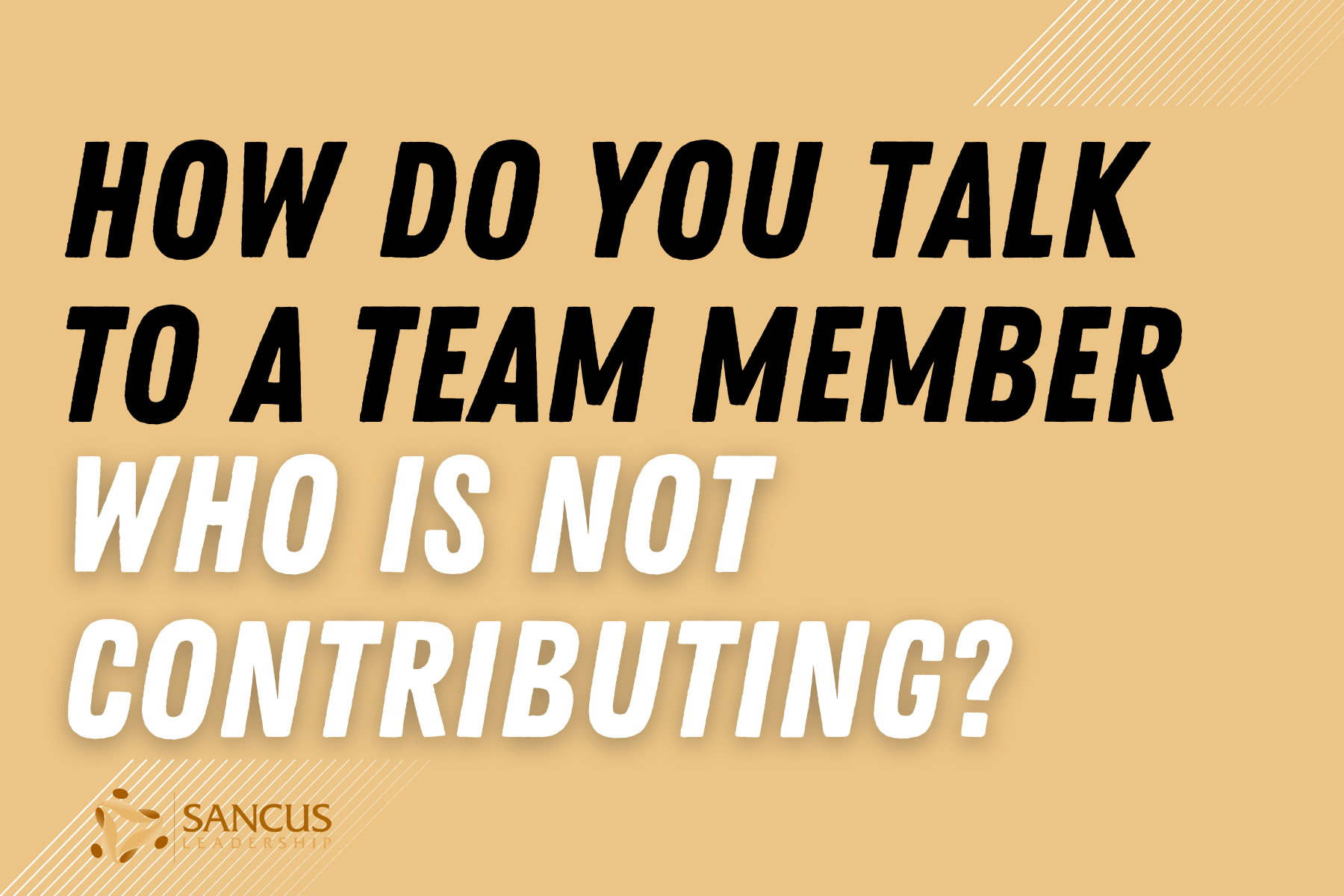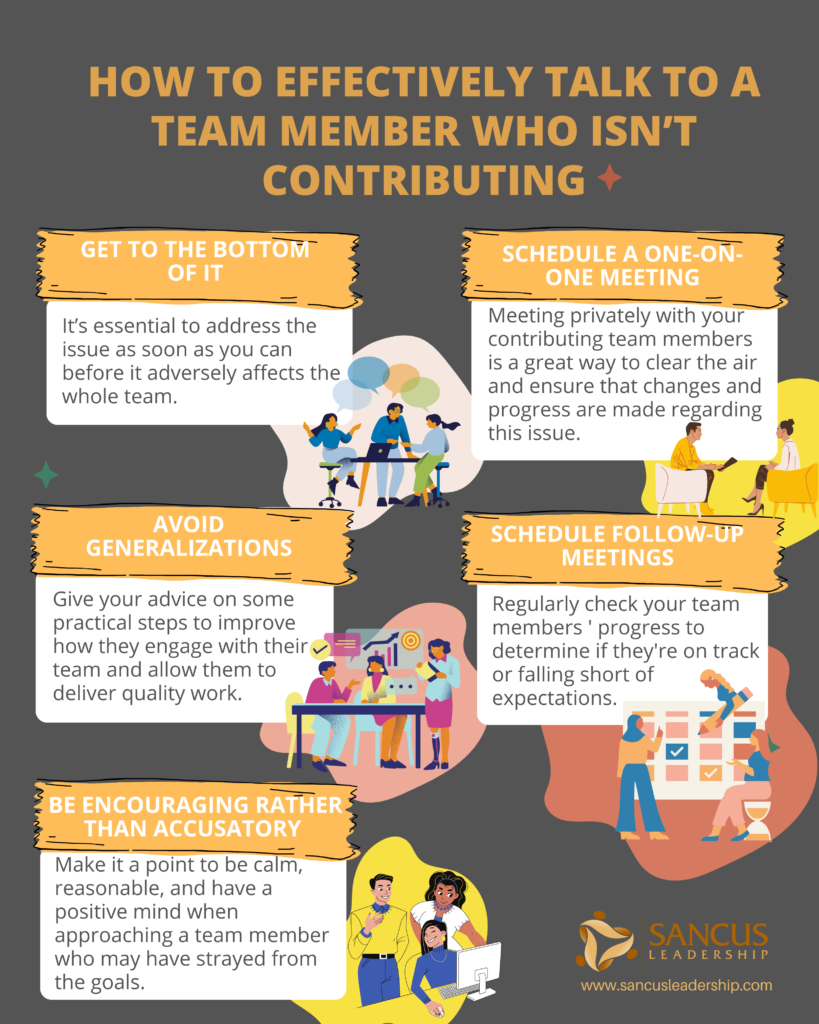Your cart is currently empty!

How Do You Talk to a Team Member Who Is Not Contributing?
Do you work with an employee who isn’t much of a team player, keen only on delivering minimum expectations and focused solely on completing their tasks? Are you beginning to feel frustrated because they aren’t contributing significantly to the team? It’s crucial to address this issue directly before it affects the whole team’s performance and before they start thinking you don’t even notice their behavior.
Talk to a team member who isn’t contributing by being straight to the point, firm, explicit, practical, encouraging, supportive, and optimistic. Uncover the real issue, offer counsel, track their progress, and set concrete goals. Opt for private encounters to avoid embarrassment.
Let’s discuss how you should approach an underperforming employee and inadequately contribute to efficiently attaining the team’s goals. We will discuss the merits of being calm, collected, and supportive instead of emotional and aggressive. I will give pointers on uncovering possible underlying issues and ensure that positive changes and progress are attained. Let’s begin!
How To Deal with an Underperforming Team Member

A team is supposed to work like a well-oiled machine, with each member performing a specific role to ensure that the group achieves the shared goals as efficiently as possible. If one of the members doesn’t pull their weight, it could spell disaster for the team, mainly if the behavior isn’t addressed early on.
A team is supposed to work like a well-oiled machine, with each member performing a specific role.
Some leaders might think one underperforming employee won’t do much damage to the team. Sometimes, they look the other way and completely ignore the situation for as long as tasks are promptly accomplished and the team’s goals are met.
This mindset is risky because minor issues may sometimes become prodigious problems affecting the team’s dynamics. Here are some scenarios you might find yourself in if you don’t address this issue directly:
- Other team members may soon notice the disparity and question your authority and leadership style.
- Others may feel they’re unjustly treated and start feeling disengaged and unmotivated.
- Some employees may also begin to underperform, thinking you condone such behavior.
- Team trust, synergy, and collaboration may be adversely affected.
- Your team’s efficiency and productivity may eventually take a dip.
As a leader, you are responsible for always being on top of the situation, nipping bad behavior in the bud, and ensuring the team reaches its shared goals in good time. By promptly confronting underperforming employees, you provide that team motivation, engagement, and productivity are always underscored.
We at Sancus Leadership coach team leaders and managers on how they can effectively talk to a team member who isn’t contributing. If you want to learn more about how to boost team collaboration and performance, call us, and we’ll be more than glad to help!

1. Get to the Bottom of It
Before getting all worked up over a disengaged or underperforming team member, try to understand why they’re not contributing. You may be surprised to discover that not everything is always as it seems.
A friend shared how a colleague got so upset with a consistently underperforming employee that he fired him on the spot during a meeting. The whole team was shocked by their leader’s reaction and told him that the freshly fired employee was dealing with depression due to the recent death of his wife. They all thought he knew about it, too.
Digging deeper into the issue can undoubtedly save you from similar perturbing predicaments, so here are some possibilities you might not have considered yet:
- Your team member may be going through some complex personal issues.
- They may need clarification about their roles and responsibilities in the team.
- They may be feeling overwhelmed and perceive their workload to be inequitable.
- Maybe their role involves working in the background and doesn’t require them to be highly visible, making them seem as if they’re not contributing anything to the team at all (think of someone in charge of finances in a group of software developers or a person handling procurement in a couple of sales executives).
It’s also possible that the employee is indeed just coasting along, reveling in the hard work of their team members and basking in unmerited recognition. In this case, it’s essential to address the issue as soon as you can before it adversely affects the whole team.
2. Schedule a One-on-One Meeting
Meeting privately with your contributing team members is a great way to clear the air and ensure that changes and progress are made regarding this issue. It also minimizes the risk of them being put on the spot and feeling embarrassed about being singled out.
Listen to your employees first to extract the underlying causes of their negative behavior. Please take this as an opportunity to uncover any difficulties they may face regarding their tasks. Consider the possibilities indicated above and not just jump to conclusions.
Listen to your employees first to extract the underlying causes of their negative behavior.
Once issues have been identified, offer support to help your team members overcome their challenges and improve their performance and contributions to the team. I suggest they take some time off to recuperate or recharge if necessary.
Most importantly, communicate to your team members your expectations for the team and each team member. This way, they distinctly understand the direction of the team and their roles in ensuring that goals are achieved.
3. Avoid Generalizations
Avoid general statements like “This is unacceptable — you have to do better” or “Make sure I see improvements next quarter.” Such information might confuse or frustrate your team members without precisely communicating what the employee needs to do and the changes you want.
Be as precise as you can be to help avoid misunderstandings. Give your advice on some practical steps to improve how they engage with their team and allow them to deliver quality work. Provide figures (e.g., percentage improvement in sales or the minimum number of new clients secured within the week) to clearly understand how close or far they are to the goal.
Be as precise as you can be to help avoid misunderstandings.
4. Schedule Follow-Up Meetings
Regularly check your team members’ progress to determine if they’re on track or falling short of expectations. By doing so, you can give them the push they need when they’re having trouble sticking to the plan and the pat on the back they earned if they’re on target.
Leading and managing a team can be highly taxing, but you must ensure you can tailor-fit your approach depending on your team members’ varying needs. An intelligent leader never leaves a struggling employee alone to figure things out themselves. Instead, they’re eager to lend a helping hand, provide the necessary support, ensure they don’t revert to old bad habits, and eventually achieve their full potential.
5. Be Encouraging Rather Than Accusatory
Make it a point to be calm, reasonable, and have a positive mind when approaching a team member who may have strayed from the goals. Don’t be reproachful, critical, and condemnatory. On the contrary, be uplifting, reassuring, and sensitive.
Don’t be emotional when talking to a team member who is not delivering and contributing. In business, impassioned arguments almost always lead nowhere and may often lead you to make unnecessary threats and insincere statements, most of which you’ll later regret.
Don’t be emotional when talking to a team member who is not delivering and contributing.
It would also be great to find out what motivates your team members. Do they crave praise and recognition? Do bonuses and perks inspire them? Are they aiming for a promotion? Make sure to convey to your employees what’s in it if they choose to perform well at their jobs.
| How To Deal with an Underperforming Team Member | Description |
| Get to the Bottom of It | Leaders and managers can effectively handle underperforming team members and help them regain motivation and productivity while maintaining a harmonious team dynamic. |
| Schedule a One-on-One Meeting | This emphasizes the importance of direct, private communication to foster open dialogue and understanding. Leaders will prepare for the meeting, set a positive tone, and actively listen to the team members ‘ perspectives while expressing concerns about their performance. |
| Avoid Generalizations | By promoting a data-driven approach, the leader objectively assesses the employee’s strengths and weaknesses, identifies root causes of underperformance, and tailors solutions accordingly. |
| Schedule Follow-Up Meetings | Through this approach, the leaders will learn effective communication techniques. By encouraging and empathetic, managers can promote a positive work culture and elevate team performance. |
| Be Encouraging Rather Than Accusatory | This resource highlights the importance of fostering an environment of trust and understanding where employees feel valued and empowered to improve. By focusing on the team members ‘ strengths and potential, managers can motivate and inspire them to overcome challenges and achieve better results. |
Here is a video sharing tips on successfully approaching an underperforming team member and improving your team’s overall performance.
Final Thoughts
You may deal with varying possibilities when faced with a team member who isn’t contributing. They may be going through tough times in their personal lives, feeling overwhelmed with the workload, or simply dodging their responsibilities. Whatever the case, you must remain constructive, supportive, and favorable to push them to change their behavior.
The way you react may directly affect the team’s performance. Your primary goal should be to convert the unenthusiastic employee into an engaged team member who knows the value of sticking to the plan and diligently performing their duties and responsibilities to the group.
